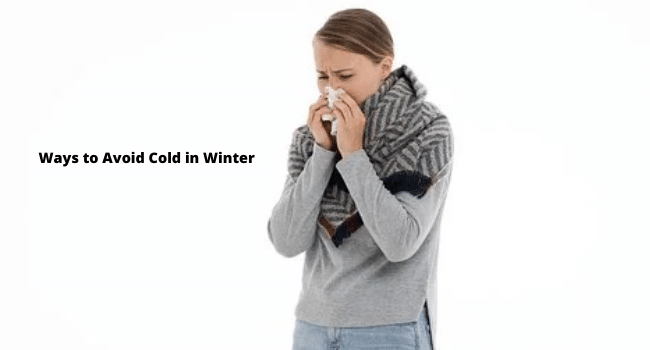Table of Contents
The dreaded common cold, yes. While not as severe as the flu, catching a cold can make even basic daily tasks more difficult even with the advantages nasal spray provides. It’s never fun to deal with sneezing, stuffy noses, and sore throats. Colds are viral infections of the upper respiratory tract, not bacterial infections.
Colds can be very contagious. Touching contaminated surfaces, coughing, and sneezing are all ways to spread them. Colds affect some people more than others. In general, colds are more common in the fall and winter months due to increased indoor contact with other people. Symptoms include:
- a scratchy, sore throat,
- sneezing
- nasal discharge that is initially watery then thickens
- tiredness
- low-grade fever (less than 100°F)
- a general sense of malaise or fatigue
So, what can you do to get rid of some of the discomforts? Consider the following ways to avoid cold in winters:
Keep Yourself Hydrated
Hydration can aid your body’s ability to fight infection. Drink lots of fluids to keep yourself hydrated. Water, decaffeinated tea, juice (avoid anything with too much sugar), and soup are all good options. Avoid dehydrating beverages such as sodas, alcohol, and coffee. Drink at least eight glasses of water each day. Fill a water bottle with water in the morning and drink it throughout the day. You can book an appointment with the best specialist through Marham and get all your queries answered
Eat Good Foods
You already know that good eating habits can help your child’s growth and development, along with preventing chronic disease as you get older. But did you know that eating nutrient-dense, well-balanced meals can also help your immune system fight off viral invaders? To increase your intake of infection-fighting antioxidants, fill at least half of your plate with a variety of colorful fruits and vegetables. In addition, eggs, jaggery, nuts, and seeds keep us warm and healthy.
Wash Your Hands Thoroughly
While germs from a sneeze or cough can float through the air on invisible droplets, they’re more likely to be picked up from an infected surface. Wash your hands thoroughly before eating, after using the restroom, and whenever you return home from somewhere else to prevent unwanted cold and flu germs from entering your body.
Clean All Surfaces
Everyone in your family picks up germs throughout the day, and some of those germs make their way into your home. Even if no one in your household is sick, you’ll want to clean more frequently during the cold and flu season to remove any lingering germ hotspots. In addition to regularly disinfecting doorknobs, faucet handles, and countertops, shared hand towels should be washed frequently.
Maintain Good Hygiene
Staying healthy requires limiting your exposure to illness by avoiding germs. Other ways to practice good hygiene include:
- Shower at least once a day.
- Before preparing food, wash your hands.
- Wash your hands before inserting contact lenses or engaging in any other activity that involves coming into contact with the eyes or mouth.
- Scrub under your fingernails for 20 seconds after washing your hands.
- When coughing or sneezing, use a tissue to cover your mouth and nose.
- Carry a hand sanitizer with you when you’re on the go.
- Shared surfaces should be disinfected, such as keyboards, phones, doorknobs, and remote controls.
Get Plenty of Sleep
A well-rested body is better able to fend off illness than one that is tired, drained, or otherwise exhausted. Getting enough sleep every night is a simple way to strengthen your immune system and natural defenses against infection. While most adults require at least seven to eight hours of sleep per night, children need 10 to 14 hours of sleep per night, depending on their age (including naps).
Try to Relax
Living in a continuous state of stress can sabotage your immune system and make you more susceptible to illness, in addition to making you feel frazzled and burned out all of the time. Remove unnecessary stressors, manage inescapable pressures, and make daily downtime a family priority to strengthen your natural defenses and protect yourself from seasonal viruses.
Quit Smoking
It’s no surprise that cigarettes are harmful to your health, but it’s less well known that they play a vital role in the spread of colds. Smoking causes an increase in the production of stress hormones, which suppress immune function. It also exposes the body to harmful ‘free radicals,’ which undermine our antioxidant defenses, increasing the risk of illness. So consult your doctor about the best ways to stop smoking.
The Takeaway
When you’re not feeling well, staying healthy entails more than just practicing a few good techniques. It involves regular exercise, consuming nutritious foods, and remaining hydrated throughout the day. Your body works really hard to keep you active and moving, so feed it the nutrients it requires to stay in top shape. If you have symptoms of cold during winters, visit a general physician right away to avoid complications.
Read more on KulFiy
Top Tips For a Healthy Digestive System
5 Creative Ways To Add Protein Powder In Your Diet
Weight Loss Tips for When You’ve Tried Everything
The Fasting Diet: How to control candida with diet?
